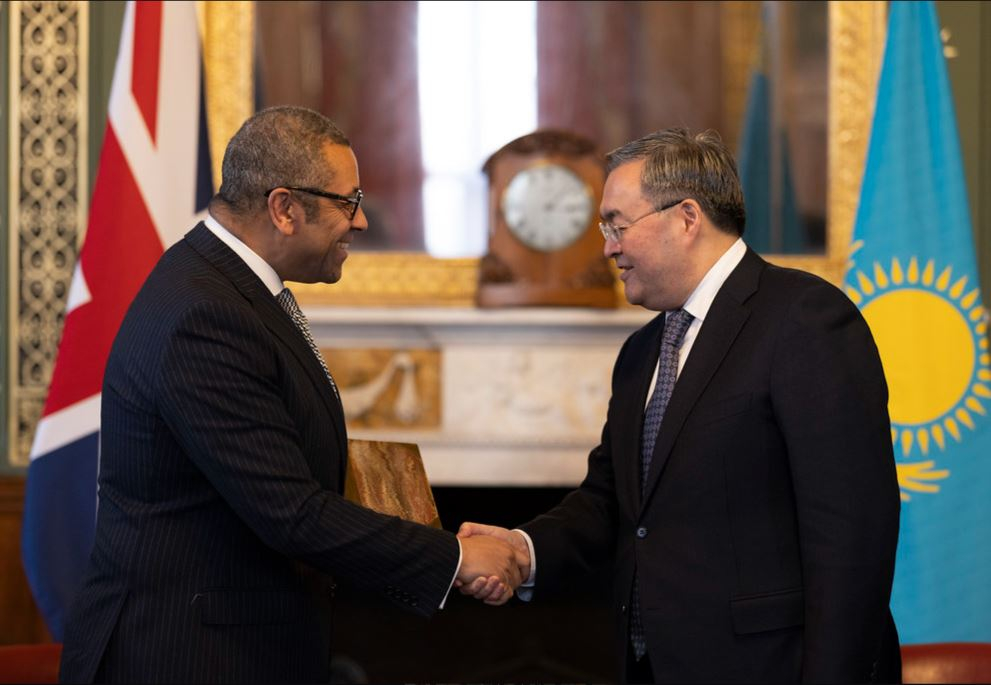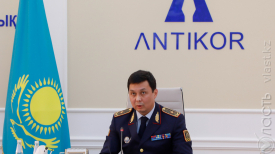UK Foreign Secretary, James Cleverly visits Kazakhstan for the first time on Saturday.
Mr Cleverly, during your visit to Kazakhstan, who will you meet among local government officials? Are there any specific topics that you plan to discuss?
I was invited to visit by my counterpart, Foreign Minister Mukhtar Tileuberdi, who I had the pleasure of hosting in London in December for the 6th UK-Kazakhstan Strategic Dialogue. It is my first ever visit to Kazakhstan and I very much hope not the last. I am truly delighted to be here, and grateful it was possible to fit this short visit in just before the important Majilis elections on Sunday.
During my visit, I will be meeting with His Excellency, President Kassym-Jomart Tokayev, the prime minister and other ministers. I want to discuss how we can continue to grow the UK-Kazakhstan strategic partnership, building upon some of the key pillars of our relationship over the past 31 years, such as trade and investment, finance and law, education and culture, and security cooperation in areas like peacekeeping.
Of course, I also plan to discuss global security issues, including the impact of Russia’s illegal invasion of Ukraine. At this exceptionally challenging time, President Tokayev has set Kazakhstan on a path of important domestic political and economic reforms. I am keen to understand the challenges and opportunities facing Kazakhstan, and how we can take our cooperation forward.
Wherever I travel I also like to meet people from other sectors, including from business, civil society, education, and the many brilliant alumni of British universities working in different fields. People in all these sectors will play a key role in building a fair and prosperous Kazakhstan during the next 30 years.
We read in October that the UK and Kazakhstan plan to sign a new Strategic Partnership and Cooperation Agreement in 2023. Which areas of cooperation do you plan to strengthen?
Now that the UK has left the European Union, we have been negotiating a Strategic Partnership and Cooperation Agreement (SPCA) as the new foundation for our bilateral relationship. The Agreement sets out the framework for close cooperation across a wide range of areas, including foreign policy, economy, trade and investment, energy and climate change, education and research, civil society and culture, and justice and human rights. We are in the final stages of negotiation and aim to sign this shortly.
Mutual areas of cooperation concentrate around measures to combat climate change and build a high-tech green economy. What concrete steps concerning these topics do you plan to bring forward during your meetings in Kazakhstan?
We think we have useful experience to help Kazakhstan achieve its Net Zero commitment by 2060. The UK underwent its own transition from coal. In 15 years we have reduced the percentage of coal used to generate electricity from 40% to less than 5%. We are at the cutting edge of new technologies, including ‘green hydrogen hubs’ to generate 5GW by 2030, enough to power 3 million homes. We have also shown that energy efficiency is the cheapest investment you can make to reduce emissions, cutting energy consumption per capita by around 25% in the last 15 years.
Protecting nature is the other side of the coin in tackling climate change. It’s great news that Kazakhstan’s work to save the Saiga antelope, and protect the biodiversity of the Great Steppe ecosystem, was recently recognised by the UN as one of its ten global flagship biodiversity restoration projects. This project was supported by a partnership of Kazakhstan’s Association for the Conservation of Biodiversity of Kazakhstan and the UK conservation NGO, the Royal Society for the Protection of Birds (RSPB). I am delighted that Kazakhstan has signed up to the High Ambition Coalition for Nature – the first country in Central Asia to do so.
One year since the start of Russia’s war in Ukraine, the socioeconomic effects of the conflict are still being felt in Kazakhstan. What do you think will happen next with the conflict in Ukraine?
President Vladimir Putin grossly miscalculated when he decided to illegally invade Ukraine. He thought he would take Ukraine in days and underestimated the strength of the Ukrainians’ resolve to protect their sovereignty and national identity. Our aim is to bring about an end to this horrendous war as soon as possible, in a way that is just for Ukraine, so we will give them the support they need to defend their sovereignty and territorial integrity.
We know the economic cost this war is having for countries around the world, including Kazakhstan, as prices spike and supply chains are disrupted. I am grateful for Kazakhstan’s consistent and principled position in supporting Ukraine’s territorial integrity, and a resolution to end the war in line with the principles of the UN Charter. Kazakhstan has also made clear it will respect sanctions and will not be a back door to sanctions circumvention. We are grateful for the open dialogue we have on this issue. We will continue to do everything we can to minimise the economic impact of Russia’s war in Ukraine on Kazakhstan.
The repression of political opposition and frequent attacks on journalists and civil society are still plaguing Kazakhstan’s democratic process. What could be the areas of cooperation between the UK and Kazakhstan to help the country make further steps in its path towards democracy?
In my speech for International Human Rights Day in December 2022, I said that protecting fundamental human rights is not only in the interests of all individuals, but that it also benefits fair, equitable economic growth, and the long-term stability of every nation. We hope to continue to share our experience of building strong, independent institutions – we’ve cooperated on different projects over the years, including on jury trials. We hope the Majilis elections on 19 March, and the Constitutional amendments strengthening human rights institutions like the Human Rights Ombudsperson, will be important next steps in taking forward reform.
Media freedom is an essential element in building effective, independent institutions. There is an important debate on this at the moment in Kazakhstan – we welcome the OSCE’s offer to provide an independent legal review of the new draft Law on Mass Media. Recent steps taken by the authorities to investigate the harassment of journalists has also sent a really important message.
Two weeks ago, the UK Prime Minister’s trade envoy to Kazakhstan, Baroness Nicholson of Winterbourne visited Kazakhstan for 4 days. Is this increased frequency in official visits a sign of a renewed stronger cooperation?
Absolutely. I hope my visit, and Baroness Nicholson’s visit earlier this month, will give our relations a positive boost. In trade and investment, we think there are great opportunities, for example, in critical minerals, clean/green technology, and agriculture. I am delighted to say that during this visit I will be signing three memorandums of cooperation in green hydrogen, critical minerals, and economic data.
We also really support Kazakhstan’s vision to become a transnational hub for education for the region, building world class partnerships with leading international universities. With the opening of the first British campus of De Montfort University in 2021, and an upcoming collaboration between Aktobe Regional University and Heriot-Watt, we think we are leading the way.
Поддержите журналистику, которой доверяют.








